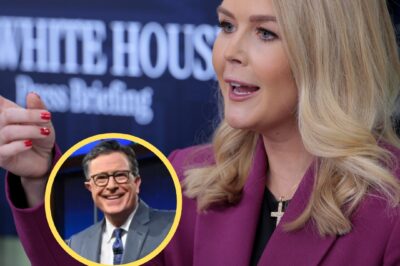Karoline Leavitt vs. The View: The On-Air Comment That Sparked a Fox News Frenzy—and Left Whoopi Goldberg Reeling

In a remarkable turn of events that has captured the attention of the nation, Karoline Leavitt, the White House press secretary, found herself at the center of a fiery moment that not only ignited social media but also set the stage for a heated national debate. On a routine segment of The Five on Fox News, Leavitt, who had only recently taken on her role as press secretary under President Donald Trump’s second term, delivered a sharp and unapologetic critique of The View and its co-host Whoopi Goldberg, forever changing the tone of the show’s political discourse.
In a segment that lasted less than 40 seconds, Leavitt did something few have dared to do—directly challenge The View’s influence, take aim at its divisive tone, and call out Whoopi Goldberg by name, all while maintaining a level of confidence and wit that stopped everyone in their tracks.
The result? Applause, backlash, headlines, and a divided nation—not along political lines, but in a debate about one critical question: Was Leavitt’s comment bold truth-telling, or was it a step too far?
How It All Began: A Discussion on Media Bias Turns Personal

The segment on The Five was initially meant to discuss the growing mistrust the public holds toward legacy media—a topic that has become a frequent discussion point on Fox News in recent years. Leavitt, invited as a guest to share her thoughts, was expected to provide insights on how public dialogue and political discourse had evolved since she started her career as a White House intern.
But when co-host Jesse Watters asked her for her take on how shows like The View shape political perceptions for the average American, Leavitt hesitated for just a moment—before delivering a response that would stun the entire room.
“Well, Whoopi Goldberg—who can barely keep a straight face on her own show—is suddenly offering political advice to the nation?” she began, raising an eyebrow in disbelief.
“If I wanted a daily dose of uninformed chaos, I’d turn on The View… oh wait, I already do.”
There was a brief silence before sharp, unfiltered laughter echoed through the studio. Some of the co-hosts smirked, others were visibly taken aback. But Leavitt did not flinch. She stood her ground.
The Real Blow: Beyond the Sarcasm, a Serious Critique
After her initial jibe, Leavitt shifted gears seamlessly into a deeper critique that extended beyond personal attacks.
“Look, it’s not about disagreement. It’s about format,” she continued. “The View doesn’t exist to inform—it exists to incite. It rewards heat over clarity, and that’s dangerous, especially in an election year.”
By reframing her critique as one of media structure rather than individuals, Leavitt made it clear: this wasn’t a personal attack; it was a philosophical discussion on how political media is shaping public perception.
The impact was immediate. Within minutes, the internet was ablaze with reactions, and the viral clip began spreading like wildfire.
The Fallout: Applause and Outrage in Equal Measure
The clip was shared across social media platforms—X (formerly Twitter), TikTok, and YouTube—within an hour. By the next morning, it had racked up over 8 million views, with hashtags #KarolineUnfiltered and #TheViewClapback trending nationally.
Supporters of Leavitt’s remark were quick to praise her for speaking out against The View and what they considered its one-sided narrative.
“Karoline said what millions have been thinking,” conservative commentator Allie Beth Stuckey tweeted.
“She dismantled The View in one sentence—and with a smile,” wrote a viral TikTok user with 250k followers.
Political strategist Charlie Kirk also weighed in, calling it the “Gen Z conservative moment we’ve been waiting for—clear, unapologetic, and fearless.”
However, the backlash was swift and just as loud. Critics, especially those aligned with The View, voiced their disapproval of Leavitt’s tone and the implications of her comment.
The View Responds—Sort Of
By the time The View aired the next morning, Whoopi Goldberg had addressed the moment in her typical calm yet firm manner. Without naming Leavitt directly, Goldberg remarked:
“When people say things about this show without ever having sat at this table, it says more about them than us,” she stated, her tone unmistakably resolute.
Co-host Joy Behar added:
“We’ve been on the air for 27 years. We’ve seen louder people come and go.”
But it was Sunny Hostin who took a more direct approach.
“It’s one thing to critique media,” Hostin said. “It’s another to belittle women for using their voices. I expected better.”
Hostin’s comment about “belittling women” set off a new firestorm. Was Leavitt’s remark about the content of The View, or was it disrespectful to the women on the show?
This triggered an even more heated debate, raising questions about respect, political discourse, and the role of women in media.
A Divided Response From Media Analysts
As the debate raged on, media analysts found themselves split. Some, like The Atlantic’s Molly Ball, dismissed the moment as a “staged hit wrapped in sarcasm,” accusing Fox News of promoting shallow confrontation rather than fostering meaningful discussion.
Others, however, defended Leavitt’s stance. Journalism professor Brian Karem argued, “This wasn’t trolling. It was a legitimate critique—delivered with polish. If the left can roast Trump surrogates, they should be ready to take it too.”
Even CNN’s Erin Burnett acknowledged the rhetorical skill in Leavitt’s response, saying, “Leavitt spoke with the kind of rhetorical discipline that most press secretaries only achieve after years in the job.”
What was undeniable was that Leavitt’s delivery had landed with undeniable force, making the comment impossible to ignore.
The Power of a Single Moment: A Nation Divided
The conversation surrounding the exchange spread across social media platforms, with viewers expressing their opinions on both sides of the political spectrum.
Some applauded Leavitt’s poised and incisive critique, while others labeled it mean-spirited and divisive. The debate illuminated a growing exhaustion with the performance-driven nature of political discourse.
“It was bold, confident, and hilarious,” one viewer wrote.
“It was nasty and beneath her role,” said another.
“The View dishes it out every day—can’t be surprised when someone fights back,” commented a third.
But perhaps most telling was the realization that Leavitt’s comment tapped into a wider frustration with the state of political commentary and its shift towards spectacle.
Leavitt Breaks Her Silence
Two days later, Leavitt addressed the controversy during an interview on a New Hampshire radio station.
“Look, I’m not here to attack people personally. I respect that The View has a platform and an audience. But when that platform consistently frames conservatives as jokes or threats, I think it’s fair to say… we see through the script.”
She concluded her remarks with a calm but resolute statement that resonated with her supporters:
“I was hired to tell the truth—not to win a popularity contest.”
Her words were shared across social media, quickly amassing nearly a million shares.
The Bigger Picture: Can Political TV Handle Unfiltered Honesty?
While the debate over Leavitt’s comments raged on, one fundamental question emerged: Has political television, particularly daytime political commentary, become more focused on sensational conflict than on clarity and substance?
Critics of The View argue that the show often sacrifices factual reporting for sensationalism, while defenders insist that it provides a valuable space for women’s voices in the political landscape.
What is clear, however, is that Leavitt’s unfiltered remarks have struck a nerve—sparking conversations about the role of media, the state of political discourse, and the power of bold, unapologetic commentary.
A Legacy in the Making?
As Leavitt’s media presence grows, she has shown that she is not just another press secretary reading from prepared talking points. At 26, she is carving out a new path for a generation of political communicators who are unafraid to challenge the status quo.
“She’s not just echoing the lines she’s told,” said media analyst Emily Jashinsky. “She’s crafting her own narrative—and she’s doing it live.”
Whether loved or loathed, Karoline Leavitt’s moment will undoubtedly leave a lasting impression on the media landscape.
Conclusion: A Moment That Will Resonate
Leavitt’s viral exchange with The View wasn’t just a cultural skirmish. It was a stark reminder that political media is evolving. In an age of division and polarization, Leavitt’s words served as a wake-up call for both the media and the public, showing that sharp, unfiltered commentary can still shake up even the most entrenched voices on television.
For now, Leavitt has moved forward, back at the podium with her signature poise. But the moment lives on, continuing to spark debate about the future of political media.
Is this the way forward, or a sign that we’ve stopped truly listening to each other? Only time will tell.
News
Caught Off Guard! Jen Psaki Drops a Photo B0mbshell That Leaves Kristi Noem Frozen on Air
It was the kind of silence that only happens on Capitol Hill when someone realizes they’ve been cornered. The kind…
🎭 Colbert’s Worst Nightmare? Karoline Leavitt Crashes the Show and Sparks Unscripted Meltdown on Live TV!
The Ed Sullivan Theater crackled with electricity on the night that political commentator Karoline Leavitt faced off with late-night host…
🧩Presidential Puzzle: How Karoline Leavitt’s Husband Is Tied to a Former Commander-in-Chief
The real estate developer shared his plans to own a sports team DONALD Trump’s press secretary Karoline Leavitt has a…
Karoline Leavitt on the Edge? Sydney Thomas Sends Shockwaves with Bold Offer to End Billionaire Drama!
Fans are clearly loving the idea VIRAL boxing ring girl Sydney Thomas has offered to replace White House Press Secretary…
No Mercy! Karoline Leavitt’s Scorching Words Shut Down ‘The View’ in Live Showdown 💣📺
Karoline Leavitt Confronts Viral Mockery—And Walks Through It with the Poise of a Queen on Her Royal Tour It all…
Silent Power! Karoline Leavitt Shuts Down Explosive Media Rumors Without Saying a Word 🔥
Karoline Leavitt Confronts Viral Mockery—And Walks Through It with the Poise of a Queen on Her Royal Tour It all…
End of content
No more pages to load









